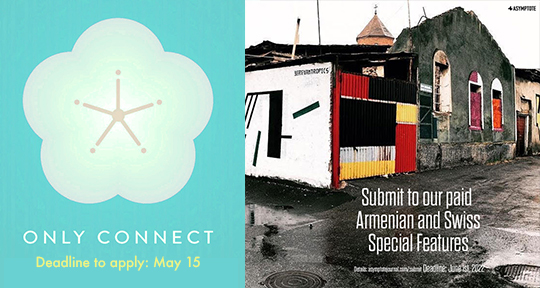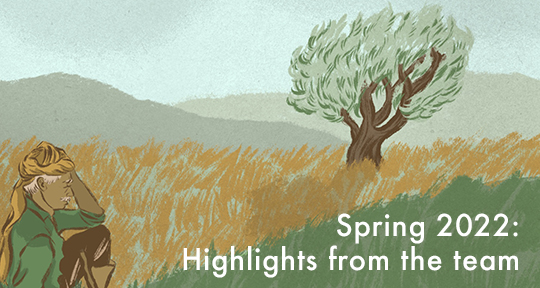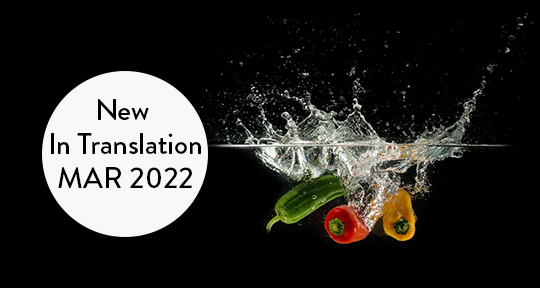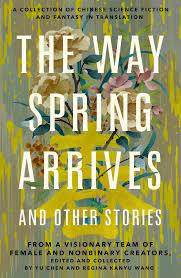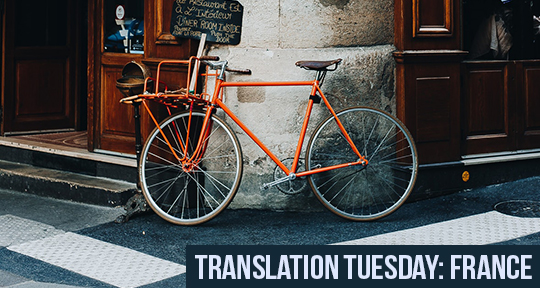This week’s Translation Tuesday follows a woman who—in pursuit of materials to build the protagonist of her novel, Madame X—visits, amongst others: a psychoanalyst, an actress, and a Pierre Huyghe exhibit. This extract from Romanian-born and Paris-based Sinziana Ravini’s debut novel La diagonale du désir, is the Swedish writer’s metafictional romp through a world of artistic and literary references in order to ask the question: how much of our own desires are constituted by our fictional encounters? Conversely, how much of fiction’s desires can be found in the actions of the world? With her translation, Kaylen Baker shows us a voice which, with characteristic humor and intelligence, uncovers the role that art and aesthetics play in forming the ground on which the mystery of our own desire is made visible.
The Pact
The building presides over the street like an impenetrable stone palace but, here and there, kissing cherubs cling to the molding façade, as if to draw out a repressed sensuality from such sobriety. Several floors up, I’m standing in the middle of a room full of books, and paintings of divinities, opposite a man who’s always filled me with dread.
“And what might I do for you, mademoiselle?”
“I came to see you because I’m writing a novel.”
“You must’ve mistaken me for someone else. I’m a psychoanalyst, not a publisher.”
“I know . . . I called on you because I want to take my main character to a shrink.”
The man begins to finger a cigar. “Imagine if every writer brought in their creative work for analysis. I’d never see the last of them! Who is this character?”
“Her name is Madame X. That’s all I can tell you for now.”
He cuts the cigar, lights it and inhales. “And what do you hope to explore through this novel?”
“I want to create a character who sets out to discover her real desire. Since I don’t have a lot of courage or imagination, I decided to ask a few women I admire to pick the plot themselves, by giving me missions, which Madame X will carry out.”
“And why not solicit any men, mademoiselle? Or do you have something against them?”
“On the contrary, but it’s the female unconscious I’d like to explore. Imagine finally being able to respond to Freud: What does a woman want?”
“Won’t she be . . . somewhat divided, this woman?”
“I see her rather as a subject in perpetual transformation.”
“So why have you come to see me—me, and not a woman?”
“Exactly because you are a man.”
“Hm. I see.”
Silence settles around us. What am I doing here? When Faust signed the pact with Mephisto, did he find his soul, or lose it?
“I think we’ll stop here.”
“So, you’ll accept to become my fictional analyst?”
“Fictional? I’m quite real myself.”
“I’d rather conceal what’s real. Didn’t Oscar Wilde say that masks make us tell the truth?”
“Yes, well, the truth, you know . . . it’s debatable. I’m not sure I’m ready to play your game.”
“And psychoanalysis, that’s not a game?”
“Indeed, but a serious one! The game you’re about to create is quite dangerous. I’m under the impression you don’t really respect psychoanalysis as it is.”
“Then treat my lack of respect like a symptom.”
“Humph.”
Taking my purse, I make as if to leave.
“Let’s say your project intrigues me. When can you come back?” READ MORE…

